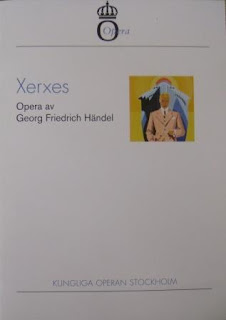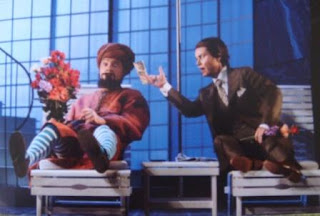(review in english below)
Serse, uma ópera de G F Handel com libretto de Bononcini é uma obra não muito conhecida do compositor, embora contenha uma das mais belas árias operáticas alguma vez escritas – Ombra mai fu.
Para além da Ombra mai fu, também conhecido como o Largo de Handel, a ópera tem várias outras árias de interesse, como Piu che penso e Cruda furia de Xerxes, uma notável ária de bravura. Para os apreciadores do barroco, entre os quais me incluo, a obra está muito acima do banal.
A encenação de Daniel Slater trás a acção para o início do Século XX. A ópera abre com a recepção de um hotel e a célebre ária de entrada (Ombra mai fu) tem como árvore alvo uma planta da recepção do hotel. Depois este transforma-se em spa, bar e aeroporto. Uma abordagem moderna com alguma graça, mas não mais que isso.
O maestro foi Andreas Stoehr que dirigiu com elevação a Kungliga Hovkapellet, uma orquestra barroca de qualidade. O Coro da Opera Real de Estocolmo também esteve bem.
As interpretações, todas por cantores desconhecidos para mim, foram de nível muito bom e dominadas por intérpretes femininas. Não houve intervenção de contra-tenores.
O mezzo-soprano Karolina Blixt foi um rei Xerxes de qualidade notável. Voz de grande potência e beleza, com graves possantes e agudos seguros foi a melhor em cena. O papel é muito exigente, está quase sempre em cena e, embora tenha começado com alguma intranquilidade (e o início é logo a ária Ombra mai fu), quando aqueceu cresceu em volume e qualidade.
((parte das fotografias são do programa da Ópera Real de Estocolmo)
Matilda Paulsson, mezzo-soprano, interpretou o irmão Arsamene. Também este globalmente bem, mas a voz era pequena e, nem sempre bem projectada.
Romilda foi interpretada pelo soprano Ida Falk Winland que foi outra grande da noite. Voz potente, timbre claro e bonito, agudos seguros e mantidos caracterizaram a interpretação ao longo da récita.
O mezzo-soprano Katarina Leoson fez a Amastre numa interpretação banal mas agradável, embora com pouca potência vocal.
***
SERSE - Kungliga Operan, Stockholm, November 2010
Serse, an opera of GF Handel with libretto by Bononcini is not one of the best known operas of the composer, although it contains one of the most beautiful operatic arias ever written - Ombra mai fu.
Xerxes (Serce), king of Persia, enjoys the shade of a tree when his brother Arsamene arrives, looking for Romilda. Both are in love with her. The bride of the king, Amastre, is changed by Romilda, but she loves her brother and always refuses Xerxes who, despite his efforts, can not see his love accepted by her. Amastre and Arsamene cause a range of intrigues to be able to reach their loved choices. In the end, Xerxes joins Amastre, who loves him faithfully. Romilda and Arsamene get married and end up as a happy couple, blessed by Xerxes.
Apart from Ombra mai fu, also known as the Largo of Handel, the opera several other arias of interest, such as Piu che penso and Cruda furia by Xerxes, a remarkable bravura aria. For lovers of the Baroque, including myself, the work is far above the banal.
The Staging of Daniel Slater puts the action at the beginning of the twentieth century. The opera opens with the reception of a hotel and the famous first aria from (Ombra mai fu) is dedicated to a plant from the hotel reception. The hotel reception becomes a spa, a bar and an airport. A modern funny setting, but not more than that.
The conductor was Andreas Stoehr who did a very good job with the Kungliga Hovkapellet, a baroque orchestra of quality. The Choir of the Royal Opera of Stockholm was also good.
The soloists, all unknown to me, showed a very good level and were dominated by female singers. There were no counter-tenors in the cast.
Mezzo-soprano Karolina Blixt was a king Xerxes of high quality. The voice had great power and beauty with powerful low range and steady top notes. She was the best on stage. The role is very demanding, she's almost always on stage and, although she started apparently with some discomfort (and the beginning is the aria Ombra mai fu) when she warmed up, the voice grew in volume and quality.
Matilda Paulsson, mezzo-soprano, played Arsamene, the brother. She was also well, although the voice was small and not always with good projection.
Romilda was interpreted by soprano Ida Falk Winland. She was another great singer. Strong voice, clear and beautiful timbre, top notes were strong and steady and characterized the interpretation along the performance.
Mezzo-soprano Katarina Leoson played Amastre in a normal but pleasant interpretation, though without a big vocal power.
***






































